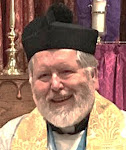Mass at St Peter's London Docks, Wapping, London
. . . the fully Christian life is a Eucharistic life: that is, a natural life conformed to the pattern of Jesus, given in its wholeness to God, laid on His altar as a sacrifice of love, and consecrated, transformed by His inpouring life, to be used to give life and food to other souls. It will be, according to its measure and special call, adoring, declaratory, intercessory and redemptive: but always a vehicle of the Supernatural. The creative spirit of God is a redemptive and cherishing love; and it is as friends and fellow workers with the Spirit, tools of the Divine redemptive action that Christians are required to live. ‘You are the Body of Christ’, said Saint Augustine to his communicants. That is to say, in you and through you the method and work of the Incarnation must go forward. You are meant to incarnate in your lives the theme of your adoration. You are to be taken, consecrated, broken and made means of grace; vehicles of the Eternal Charity.
 Thus every Christian communicant volunteers for translation into the supernatural order, and is self-offered for the supernatural purposes of God. The Liturgy leads us out towards Eternity, by way of the acts in which men express their need of God and relation to God. It commits every worshipper to the adventure of holiness, and has no meaning apart from this. In it the Church shows forth again and again her great objective; the hallowing of the whole created order and the restoration of all things in Christ. The Liturgy recapitulates all the essentials in this life of sanctification — to repent, to pray, to listen, to learn; and then to offer upon the altar of God, to intercede, to be transformed to the purposes of God, to be fed and maintained by the very life of God.
Thus every Christian communicant volunteers for translation into the supernatural order, and is self-offered for the supernatural purposes of God. The Liturgy leads us out towards Eternity, by way of the acts in which men express their need of God and relation to God. It commits every worshipper to the adventure of holiness, and has no meaning apart from this. In it the Church shows forth again and again her great objective; the hallowing of the whole created order and the restoration of all things in Christ. The Liturgy recapitulates all the essentials in this life of sanctification — to repent, to pray, to listen, to learn; and then to offer upon the altar of God, to intercede, to be transformed to the purposes of God, to be fed and maintained by the very life of God.
And though it is the voice of the Church, none the less in it is to be recognized the voice of each separate soul, and the care of the Praying Church for each separate soul. ‘Holy Things for the Holy!’, cries the celebrant in the earliest liturgies, as he lifts up the consecrated gifts. Not ‘Good Things for the Good’; but supernatural things for those imperfect creatures who have been baptized into the Supernatural, translated to another order — those looking towards God the Perfect and beginning to conceive of life as a response to God the Perfect; but unable without the ‘rich bread of Christ’ to actualize the state to which they are called.
- Evelyn Underhill, from The Mystery of Sacrifice


















0 comments:
Post a Comment